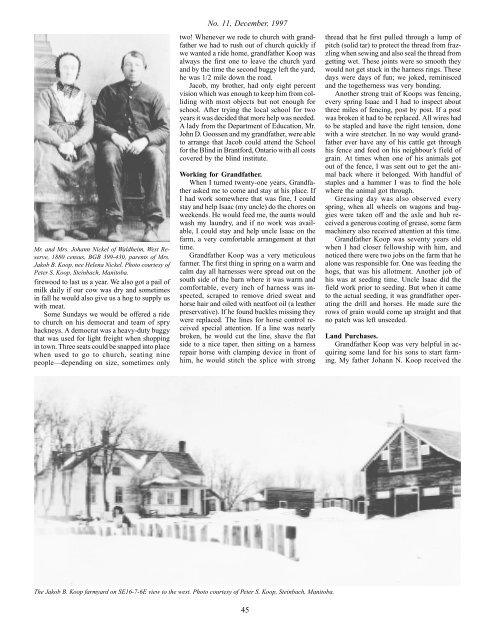Preservings 11 (1997) - Plett Foundation
Preservings 11 (1997) - Plett Foundation
Preservings 11 (1997) - Plett Foundation
Create successful ePaper yourself
Turn your PDF publications into a flip-book with our unique Google optimized e-Paper software.
Mr. and Mrs. Johann Nickel of Waldheim, West Reserve,<br />
1880 census, BGB 399-430, parents of Mrs.<br />
Jakob B. Koop, nee Helena Nickel. Photo courtesy of<br />
Peter S. Koop, Steinbach, Manitoba.<br />
firewood to last us a year. We also got a pail of<br />
milk daily if our cow was dry and sometimes<br />
in fall he would also give us a hog to supply us<br />
with meat.<br />
Some Sundays we would be offered a ride<br />
to church on his democrat and team of spry<br />
hackneys. A democrat was a heavy-duty buggy<br />
that was used for light freight when shopping<br />
in town. Three seats could be snapped into place<br />
when used to go to church, seating nine<br />
people—depending on size, sometimes only<br />
No. <strong>11</strong>, December, <strong>1997</strong><br />
two! Whenever we rode to church with grandfather<br />
we had to rush out of church quickly if<br />
we wanted a ride home, grandfather Koop was<br />
always the first one to leave the church yard<br />
and by the time the second buggy left the yard,<br />
he was 1/2 mile down the road.<br />
Jacob, my brother, had only eight percent<br />
vision which was enough to keep him from colliding<br />
with most objects but not enough for<br />
school. After trying the local school for two<br />
years it was decided that more help was needed.<br />
A lady from the Department of Education, Mr.<br />
John D. Goossen and my grandfather, were able<br />
to arrange that Jacob could attend the School<br />
for the Blind in Brantford, Ontario with all costs<br />
covered by the blind institute.<br />
Working for Grandfather.<br />
When I turned twenty-one years, Grandfather<br />
asked me to come and stay at his place. If<br />
I had work somewhere that was fine, I could<br />
stay and help Isaac (my uncle) do the chores on<br />
weekends. He would feed me, the aunts would<br />
wash my laundry, and if no work was available,<br />
I could stay and help uncle Isaac on the<br />
farm, a very comfortable arrangement at that<br />
time.<br />
Grandfather Koop was a very meticulous<br />
farmer. The first thing in spring on a warm and<br />
calm day all harnesses were spread out on the<br />
south side of the barn where it was warm and<br />
comfortable, every inch of harness was inspected,<br />
scraped to remove dried sweat and<br />
horse hair and oiled with neatfoot oil (a leather<br />
preservative). If he found buckles missing they<br />
were replaced. The lines for horse control received<br />
special attention. If a line was nearly<br />
broken, he would cut the line, shave the flat<br />
side to a nice taper, then sitting on a harness<br />
repair horse with clamping device in front of<br />
him, he would stitch the splice with strong<br />
The Jakob B. Koop farmyard on SE16-7-6E view to the west. Photo courtesy of Peter S. Koop, Steinbach, Manitoba.<br />
45<br />
thread that he first pulled through a lump of<br />
pitch (solid tar) to protect the thread from frazzling<br />
when sewing and also seal the thread from<br />
getting wet. These joints were so smooth they<br />
would not get stuck in the harness rings. These<br />
days were days of fun; we joked, reminisced<br />
and the togetherness was very bonding.<br />
Another strong trait of Koops was fencing,<br />
every spring Isaac and I had to inspect about<br />
three miles of fencing, post by post. If a post<br />
was broken it had to be replaced. All wires had<br />
to be stapled and have the right tension, done<br />
with a wire stretcher. In no way would grandfather<br />
ever have any of his cattle get through<br />
his fence and feed on his neighbour’s field of<br />
grain. At times when one of his animals got<br />
out of the fence, I was sent out to get the animal<br />
back where it belonged. With handful of<br />
staples and a hammer I was to find the hole<br />
where the animal got through.<br />
Greasing day was also observed every<br />
spring, when all wheels on wagons and buggies<br />
were taken off and the axle and hub received<br />
a generous coating of grease, some farm<br />
machinery also received attention at this time.<br />
Grandfather Koop was seventy years old<br />
when I had closer fellowship with him, and<br />
noticed there were two jobs on the farm that he<br />
alone was responsible for. One was feeding the<br />
hogs, that was his allotment. Another job of<br />
his was at seeding time. Uncle Isaac did the<br />
field work prior to seeding. But when it came<br />
to the actual seeding, it was grandfather operating<br />
the drill and horses. He made sure the<br />
rows of grain would come up straight and that<br />
no patch was left unseeded.<br />
Land Purchases.<br />
Grandfather Koop was very helpful in acquiring<br />
some land for his sons to start farming.<br />
My father Johann N. Koop received the
















